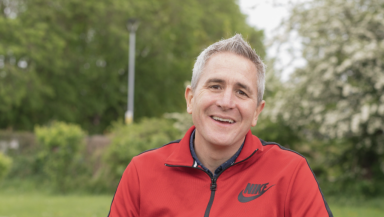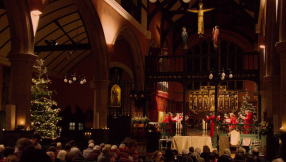
Asking for help is hard. It makes us vulnerable. To openly admit 'I can't do this by myself, I need support'. It's an act that is made so much harder when we are meant to be the strong one. The one that everyone else depends upon. The one people turn to in their time of need.
I saw the latest Disney film Encanto with my twin daughters recently. It's well worth a watch and surprisingly relatable. The one theme that particularly resonated was the pressure to be strong - a pressure that is faced by so many in positions of leadership or responsibility. The character Luisa is relied upon to solve her family and communities' problems and in the song "Surface Pressure" she sings, "I'm pretty sure I'm worthless if I can't be of service" – "Who am I if I can't carry it all? If I falter?". For clergy, these are thoughts that can cross your mind countless times. If I admit weakness, surely everyone else will crumble.
When you are in church leadership, it is really hard to admit that you need help. It is a pastor's job to support the flock, to walk alongside people in their struggles as well as in their joys. You need to be there when they need you, but you shouldn't need help. So, when things get too much, you bottle things up, you feel it is your responsibility to shoulder the load.
I have been a minister for the Church of England for over 10 years and there have been times when I have tried to ignore my own needs, thinking this is the only way I can be there for others 24/7. This has been particularly the case for me as a Pioneer Minister, running a church from a room above a pub and in homes and cafes – meeting in the evenings and weekends.
I love it. We have seen God at work in incredible ways.
But even despite being a huge extrovert, I can find it pretty full-on. Your social life and your priestly life are understandably interlinked. It's a joy, but it can also be difficult. Sometimes it's difficult to strike a healthy balance between church life and home life.
Church leaders are always reluctant to draw attention to themselves and their needs. But I think it is high time we face up to what is an unspoken reality amongst clergy. Church leaders are giving out all the time pastorally in all kinds of ways and this can be hard on our mental health.
I first became aware of just how many of my brothers and sisters in Christ were struggling through my mother's work as a therapist. I know over the years she has numbered among her clients many church leaders.
I have always felt blessed that there is no stigma around getting counselling – my mum's job meant it always felt like a normal, healthy practice. It has always felt like a normal thing to do and that's why I'm passionate about ensuring ministers get the help they need.
But for me personally, thankfully, I was able to access free counselling through Clergy Support Trust. If you are an Anglican minister or their wife or husband or partner, I really recommend you look them up. Money should never be the reason you can't get the help you need and just getting a few counselling sessions was a huge deal for me. It really helped give me perspective and I am thrilled to have the chance to give back to the charity by taking part in their Festival Service at St Paul's in May.
Seeking help from Clergy Support Trust was a game changer for me on a personal level, but also just amazing for my ministry. As many ministers and church leaders will know all too well, when we are struggling in our own lives then our ministry can suffer. That isn't a reason for guilt but a prompt to acknowledge that the healthier you are mentally and physically, the more able you are to serve others. That means investing in yourself, it means taking time out when you need it and ultimately, it means asking for help when you need it.
Admitting our failures, weaknesses and limitations is at the heart of our Christian faith. So why should this apply any less to clergy? We are all called to be like Jesus, but we aren't called to be Jesus. You may be leading a church, but you are still part of the body. A part of the body that is as human as any other part.
In 2 Corinthians, Paul talks about us as jars of clay, Christ's grace and glory shining through the cracks. It is not shameful to show the cracks, but it is dangerous to paper over them. So please, if you are struggling, ask for help.
For free tickets to the Clergy Support Trust Festival visit: https://www.clergysupport.org.uk/festival-2022
A former journalist, Matt Woodcock is an ordained Church of England pioneer minister in his home city of York, leading an innovative Christian community for young adults called The Upper Room. Matt is a regular contributor to BBC Radio 2's Pause For Thought on Zoe Ball's Breakfast Show. He is the author of two best-selling books, Becoming Reverend and Being Reverend, both based on his honest, hilarious and real-life diaries, and chart his unlikely journey from journalism to the priesthood.













